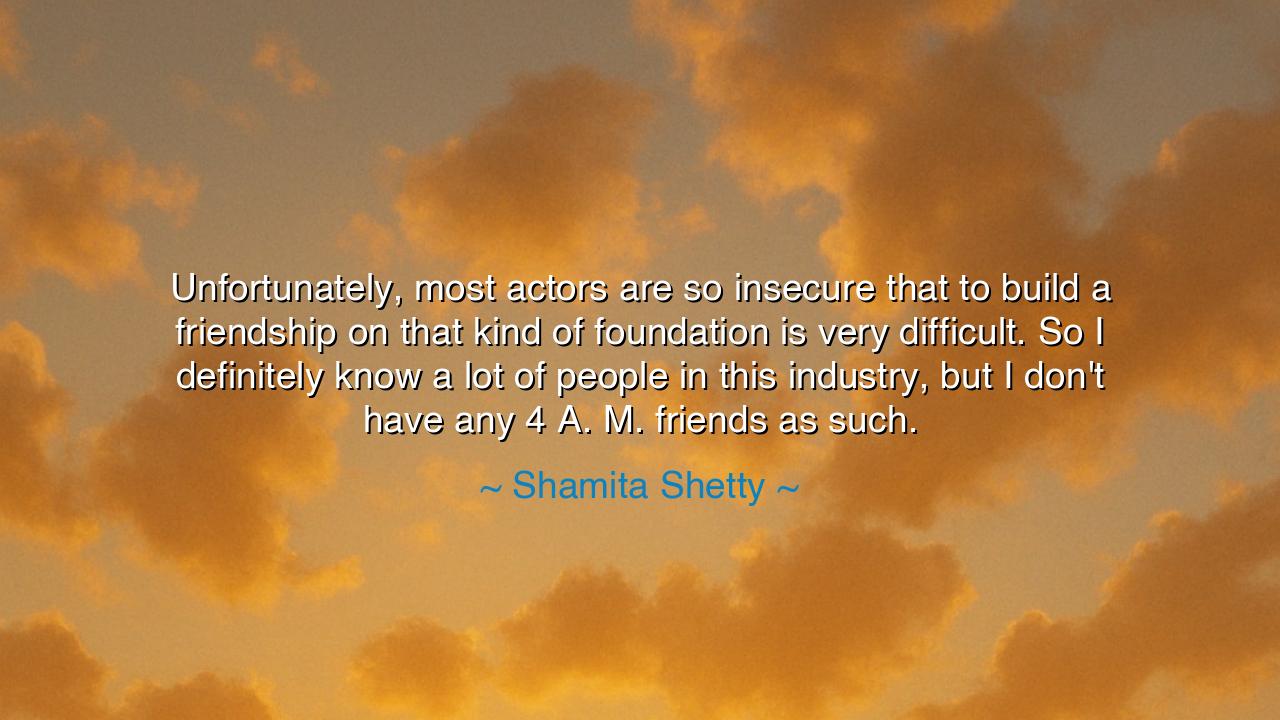
Unfortunately, most actors are so insecure that to build a
Unfortunately, most actors are so insecure that to build a friendship on that kind of foundation is very difficult. So I definitely know a lot of people in this industry, but I don't have any 4 A. M. friends as such.






In the delicate and intricate dance of human relationships, the foundation upon which a bond is built matters deeply. Shamita Shetty’s words, "Unfortunately, most actors are so insecure that to build a friendship on that kind of foundation is very difficult. So I definitely know a lot of people in this industry, but I don't have any 4 A. M. friends as such," reveal a truth about the nature of friendship in environments marked by competition, ego, and self-doubt. She speaks of a foundation that is fragile, one that often comes from insecurity rather than mutual respect and trust. In such environments, true friendships are rare, and it is this scarcity of deep, unwavering connections that leads to a life surrounded by acquaintances but lacking the intimacy and trust of the 4 A.M. friend—someone you can turn to in your darkest hour.
The ancient world was no stranger to the complexities of friendship, particularly when it was shaped by external pressures like ambition and fear. Aristotle, in his treatise Nicomachean Ethics, spoke of the three types of friendships: those based on utility, those based on pleasure, and the highest form—those based on virtue. The first two forms of friendship are fleeting, often driven by self-interest, while the third, the friendship of virtue, is built on a deep, mutual respect for one another’s character and shared values. This friendship, Aristotle believed, is the truest and most enduring. In the world of acting and entertainment, however, many relationships are rooted in utility—a mutual benefit of advancing one's career or securing a role—and therefore often lack the depth that Shetty yearns for.
In the context of the acting world, where insecurities often run rampant, friendships are frequently seen through a lens of competition and comparison. The greatest philosophers of the ancient world understood the destructive nature of insecurity. Socrates, for example, spoke often of the importance of self-knowledge—to know oneself was to be free of the need for external validation. This wisdom, passed down through the ages, calls us to look inward rather than outward for our sense of worth. When self-doubt rules the heart, it makes building authentic relationships difficult. Instead of offering trust and vulnerability, a person bound by insecurity is often more focused on protecting their image and reputation, leaving little room for the deep connections that form true friendships.
In the ancient Roman world, the relationship between Cicero and his close friend Atticus is a shining example of a friendship of virtue. Their bond was not based on any utility or outward appearance but on a shared belief in the importance of philosophy and morality. They were able to offer each other unwavering support, not because they stood to gain anything from each other, but because their connection was grounded in mutual respect and trust. This is the kind of bond Shetty yearns for—the kind of friendship that transcends superficiality and is forged through shared values and unshakable loyalty. It is a bond that survives the tests of time and difficulty because it rests on a foundation of truth and integrity, not insecurity or competition.
In the modern world, however, the environment Shetty describes—where insecurity reigns and friendships are difficult to form—has become more common, especially in industries like entertainment, where success is often measured by outward achievements. In such an environment, the pursuit of personal success often comes at the expense of true connection. The superficial relationships that result from shared goals or mutual benefit may appear friendly on the surface, but they lack the depth and trust needed for a true, lasting friendship. This is why Shetty laments the absence of 4 A.M. friends, those few individuals in your life with whom you can share your deepest vulnerabilities without fear of judgment or competition.
The lesson Shetty’s words teach us is one of self-awareness and authenticity in relationships. True friendships are not formed in the competitive spaces of our careers, nor in the superficial exchanges of pleasantries or mutual benefit. They are born in moments of vulnerability, where we can show our authentic selves without fear of rejection or competition. Insecurity, though a natural human feeling, should not be the foundation of our relationships. Instead, we must seek to build friendships based on mutual trust, support, and shared values, understanding that true friendship is a rare and precious thing.
In your own life, strive to surround yourself with individuals who bring out the best in you, who are not driven by competition or insecurities, but by a desire to grow together. Be the kind of friend who offers unwavering support and honesty, and seek out those who offer you the same. Recognize that authentic friendships—like those of virtue described by Aristotle—are not built overnight but require patience, self-awareness, and mutual respect. By cultivating these deep, meaningful relationships, you will find that, like Shetty, you too will have friends who are not only by your side in moments of success but who will stay with you through the most difficult hours, those moments when you need a 4 A.M. friend.






AAdministratorAdministrator
Welcome, honored guests. Please leave a comment, we will respond soon